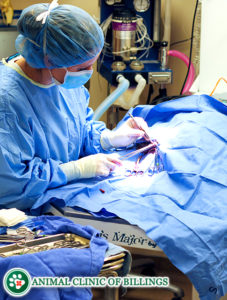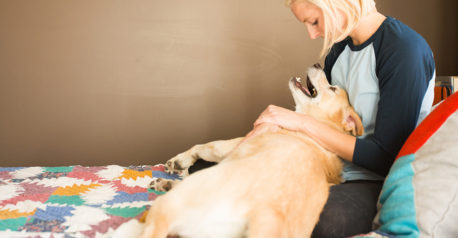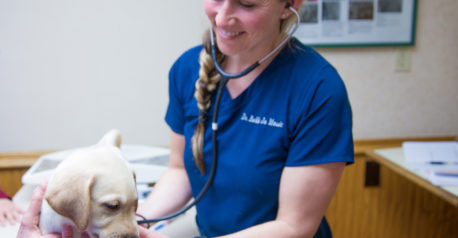Dog Surgery
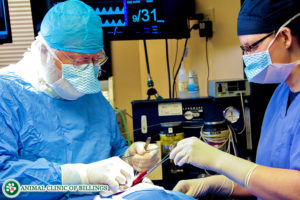
What to know if surgery is advised for your dog
At the Animal Clinic of Billings and Animal Surgery Clinic, we understand how frightening a recommendation for surgery on your dog can be. This isn’t something our veterinarians take lightly. If surgery is recommended for your dog by one of our veterinarians, you can rest assured that we have gathered all the information needed to reach that conclusion with the highest level of confidence possible. Every surgical case our veterinarians manage is always thoroughly evaluated with diagnostic testing and imaging first to ensure that surgery is, in fact, necessary and in the best interest of your dog.
Additionally, if your dog is undergoing surgery at our veterinary hospital, then it’s being performed by one of our highly talented, competent, and experienced veterinary surgeons.
Most surgeries on dogs are low-risk procedures
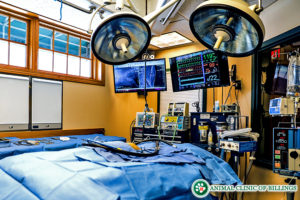
Although any surgery carries a potential risk of complications, these risks are usually very low, and our veterinary surgeons are highly trained and experienced in maintaining your pet’s safety as our top priority.
Many dogs and cats will need surgery at least once in their lifetime. As caring pet owners, we want our canine and feline companions to receive the best veterinary surgical care possible in a safe, comfortable environment. The Animal Surgery Clinic of Billings understands these concerns.
Our facility features a state-of-the-art modern surgical suite, and our doctors perform all types of surgical procedures with top-of-the-line anesthetic monitoring equipment to ensure our patients’ safety and comfort throughout their surgical procedure.
Making The Decision To Proceed With Surgery on your dog
The decision to proceed with any surgical procedure involves an at-length discussion between you and your veterinarian to address everything from possible complications to prognosis and recovery care.
These may include:
- Possible risks involved in general anesthesia based on the dog’s general health and current condition
- Possible intraoperative complications
- Possible postoperative complications
- Prognosis for return to normal or near-normal function following surgery
- Prognosis if surgery is not performed and alternatives to surgery (if they exist)
- Post-surgery hospitalization time and care that will be provided while in the hospital
- Post-surgery recovery time and home care
- Physical Rehabilitation Therapy
- Regenerative Therapy options
Our veterinarians want you to feel comfortable and confident in your decision to proceed with surgery if we recommend it for your dog. Our veterinarians will work diligently with you to ensure you are fully informed of all relevant considerations and possible outcomes of the operation. Our goal in choosing to proceed with surgery is for both you and your veterinarian to feel as confident as possible that the proposed surgery is the most ethical, compassionate, and medically sound decision to treat your dog.
Instructions for surgery on dogs
Pre-surgery
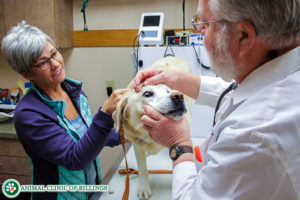
If surgery is recommended for your dog, please know how important it is that you follow your veterinarians’ advice throughout every step of the surgical process. The instructions your veterinary surgeon recommends can vary immensely depending on the surgical procedure being performed, so come prepared and feel free to take notes if you need to.
Your dog will need to be fasted before the surgery, meaning your dog may not be allowed to eat or drink anything the morning of or night before the operation. This is very important for the safe administration of anesthesia for their surgery. Oftentimes, dogs need to be carefully monitored or properly medicated by a veterinarian before and/or after major surgical procedures.
It’s important to understand that if your veterinarian recommends admitting your dog to our hospital for any length of time before or after surgery, it’s for a very good reason and in the best interest of your dog.
Anesthesia for dogs during surgery
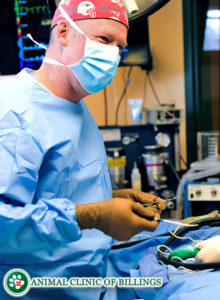
Anesthesia and monitoring are essential aspects of every surgery we perform. Anesthesia is tailored to the individualized needs of your dog or cat based on a number of factors. These include the type of procedure, your pet’s age and breed, current physical status, the presence of any chronic health conditions, the presence of any bloodwork abnormalities, and any prior anesthetic experiences. By precisely tailoring each patient’s anesthetic protocol, we are able to minimize side effects and facilitate a smooth recovery.
Prior to being anesthetized, your pet is given a pre-anesthetic dose of pain medication and sedation to help keep them calm and relaxed as they are prepared for surgery and to ensure that pain control is distributed throughout their body before the surgery begins. In most cases, these pre-anesthesia medications also decrease the dose of anesthetic needed during the surgical procedure.
Once the pre-anesthesia medication takes effect, an IV catheter is placed into a vein in the dog or cat’s front leg. This allows us to administer IV fluids during and after surgery. IV fluids are important during surgery to help support a patient’s blood pressure and maintain adequate blood flow to all of their internal organs while they are under anesthesia. Additionally, IV catheters provide quick access to the bloodstream, for easy and rapid administration of additional medications that may be necessary during surgery.
Throughout their anesthesia and surgery, your dog or cat is closely monitored by a veterinary technician using our advanced monitoring systems. This equipment continuously tracks a patient’s oxygen level, respiratory rate, heart rate and rhythm, blood pressure, carbon dioxide exhalation, and core body temperature. By continuously monitoring all of these parameters, we are able to provide the highest possible level of safety for your dog or cat. You can take comfort in knowing we provide the highest possible level of surgical care and anesthetic safety to our clients and their pets.
Post Surgical Care For Dogs
After surgery, your dog’s activity should be strictly limited until your veterinarian tells you otherwise. There is no substitute for rest when it comes to healing. Too much activity in the immediate post-operative period can result in serious complications, such as opening of the incision, excessive swelling, surgical site infection, and the breakdown of orthopedic repairs.
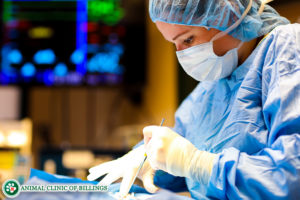 For most soft tissue surgeries, a dog can return to full physical activity after 2-4 weeks, and this will be confirmed by your vet at their two week recheck and suture removal appointment. The recovery period for orthopedic surgeries is typically longer, and varies depending on the specific procedure as well as individual factors. At each post-operative recheck, your vet will advise you on what level of activity is safe for your dog. Orthopedic patients are also started on a customized progressive physical rehabilitation program shortly after surgery, which aids in comfort, healing, and a more rapid return to optimal function.
For most soft tissue surgeries, a dog can return to full physical activity after 2-4 weeks, and this will be confirmed by your vet at their two week recheck and suture removal appointment. The recovery period for orthopedic surgeries is typically longer, and varies depending on the specific procedure as well as individual factors. At each post-operative recheck, your vet will advise you on what level of activity is safe for your dog. Orthopedic patients are also started on a customized progressive physical rehabilitation program shortly after surgery, which aids in comfort, healing, and a more rapid return to optimal function.
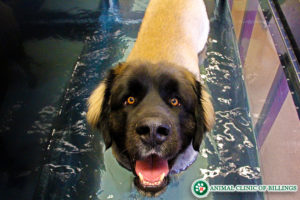 We highly recommend incorporating physical rehabilitation therapy and laser therapy into your dog or cat’s post-surgery rehabilitation program in conjunction with our recommended home care. Our orthopedic patients consistently demonstrate improved recovery times and final outcomes when they frequent our underwater treadmill and laser treatment center during the critical months after surgery. If your dog or cat has just had a major orthopedic surgery procedure, ask your vet for post-op rehab instructions. We’ve laid out a typical fracture rehab guideline and time table HERE.
We highly recommend incorporating physical rehabilitation therapy and laser therapy into your dog or cat’s post-surgery rehabilitation program in conjunction with our recommended home care. Our orthopedic patients consistently demonstrate improved recovery times and final outcomes when they frequent our underwater treadmill and laser treatment center during the critical months after surgery. If your dog or cat has just had a major orthopedic surgery procedure, ask your vet for post-op rehab instructions. We’ve laid out a typical fracture rehab guideline and time table HERE.
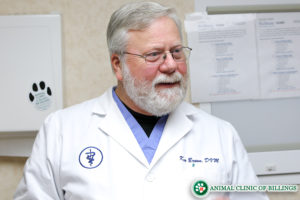 How to schedule surgery for your dog
How to schedule surgery for your dog
When accidents occur, follow the advice of your veterinarian, who always has your dog’s best interest in mind. Because addressing a significant injury can often be time-sensitive, if your dog has been injured or you’ve been referred to us by your regular veterinarian for surgery, please call us immediately to schedule an appointment with one of our highly skilled veterinary surgeons. Our veterinarians and support staff are here to help your canine companion get back to living the healthiest and most comfortable life possible.
Types of dog surgery our veterinary hospital offers
At the Animal Clinic of Billings and Animal Surgery Clinic, canine surgical procedures typically fall into two categories: soft-tissue surgery and orthopedic surgery.
MAJOR ORTHOPEDIC PROCEDURES
If your dog or cat has a broken leg, a broken back or some other severely broken bone or fracture, our orthopedic surgery team at the Animal Clinic of Billings and Animal Surgery Clinic are here to help! Many of the surgical procedures performed by Dr. Brown, Dr. Flamme, Dr. Albrecht at the Animal Clinic of Billings and Animal Surgery Clinic on any given day can be among the most advanced and cutting-edge veterinary surgical procedures.
Doctors Brown, Flamme, and Albrecht have more than 96 years combined veterinary practice experience and have successfully managed thousands of complex orthopedic injuries.
Drs. Brown, Flamme, and Albrecht provide arthroscopic joint surgery, advanced ACL and CrCL injury procedures in Billings, including TPLO and TTA, partial and complete joint fusions, elbow dysplasia surgeries including PAUL, and CUE, total hip replacements, advanced limb straightening procedures in addition to many other advanced forms of spine surgery, knee surgery, shoulder surgery, pelvic fracture surgery, bone grafting, and torn or ruptured ligament repair procedures on dogs and cats at the Animal Clinic of Billings and Animal Surgery Clinic in Billings Montana.
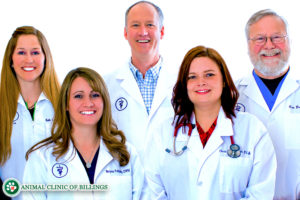
Let our highly trained and experienced team of veterinarians and veterinary technicians help you keep your dog as happy and healthy as they can be.
Call the Animal Clinic of Billings to schedule your dogs next wellness examination with us today!
406-252-9499 REQUEST AN APPOINTMENT


